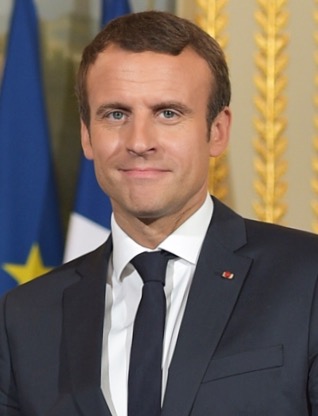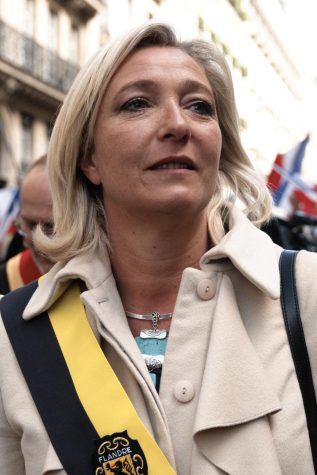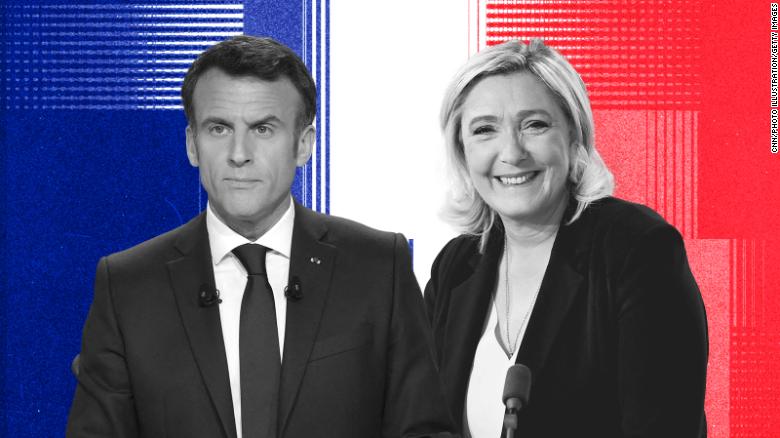The Far-Right in the French Election: Liberalism at Risk
Emmanuel Macron and Marine Le Pen will face each other in a runoff presidential election on Sunday, April 24 — a rematch of the 2017 vote. | Photo Credit: CNN
Tensions are once again high in France, as the election for the nation’s presidency has proven to be remarkably close. Much like the previous election, the liberal candidate, Emmanuel Macron, faces off against the far-right Marine Le Pen, whom Marcon previously defeated. This time the results are trending differently, with Le Pen giving Macron a run for his money in the first round of voting, leaving the incumbent with a small lead of 4.7%. With the second round of voting coming later this month, the fear of a far-right presidency in France has grown increasingly relevant and problematic.
The French Election Process Explained
French electoral politics is a unique and sometimes complicated process. Unlike in the United States, where the electorate votes for representatives in the electoral college, the French election system goes through two rounds every five years. In the first round, candidates must get 500 signatures from various elected officials, including anything from mayors to members of Parliament or other local officials.
Once on the ballot, voters can support any candidate they want, irrespective of party. Suppose nobody gains a majority of the vote. In that case, the second round begins, and the two most popular candidates run against each other in a final attempt to gain public support.

Introducing Emmanuel Macron
Macron’s rise to power was one of ambition and many interests. A graduate of Paris Nanterre University and an eventual graduate of public affairs, Macrons has worked in various positions within the French government. He took a position as an inspector for the Finance Ministry in 2004 before leaving to become an investment banker in 2008, joining the firm Rothschild and Co. Once there, Marcon netted an estimated $3.2 million, though he claimed that he made only $2 million. By the time he left his firm in 2012, Macron was already a millionaire, a reality that has raised some eyebrows in France.
Macron returned to French politics in 2012, having tried and failed to gain a seat in the National Assembly of Picardy as early as 2007. However, this time, he had a way into the French Socialist Party. Through his friendship with the former secretary-general of the Socialist Party, François Hollande, Macron tied himself to the future president and was appointed that administration’s deputy secretary-general. He would later be appointed as the minister of the economy but left government again in 2016 after establishing a centrist party known as En Marche, through which he announced his presidential bid.
Through his centrist platform, Macron emphasized what he called a “democratic revolution” in France and that the nation needed to “unblock” itself. Macron would eventually find his own blockage and opposition in another, more radical party, the National Front, and its candidate Marine Le Pen. By the end of the first round in 2017, Macron was ranking the number one candidate for the presidency.
Who is Marine Le Pen?

Marine Le Pen is as much a controversial figure as she is a staple of France’s emerging frustration with the international stage. The daughter and political heir of notorious far-right politician Jean-Marie Le Pen, Marine has played a significant role in rebranding her father’s party despite its intense history of antisemitism. Being the founder and leader of the National Front for many years, Jean-Marie Le Pen has been convicted six times of ‘inciting racial hatred against Muslims and Jewish people, including his tendency to downplay the Holocaust.
For a time, Marine was a part of her father’s party apparatus and played a significant role in its march forward, supporting a rebranding campaign as president of an associate organization, Generations Le Pen. In 2006, Marine supported her father’s failed bid for the presidency, but she would begin her first steps in taking control of the party. By 2010, she began assembling the support of the party’s leadership and her father’s endorsement, gaining control of the party as its new president.
Once in control, the new Le Pen began what could only be described as a rebranding campaign that resulted in her expelling her father in 2015 due to his continuous failure to hold back his antisemitism, including comments he made about Nazi gas chambers. Those comments prompted Marine to denounce those statements publicly, saying, “I say what I have always said: I do not share the same vision of these events as my father.” Additionally, Marine attempted to reorient the party to avoid its previous tarnished statements on Word War II and France’s colonial wars, which some have referred to as “the far right with a human face.”
Despite this attempt at reconfiguration, Marine is not immune nor opposed to some of the prejudices that continue to plague the far right. She readily supports banning head coverings for women in public life, clearly targeting France’s Muslim and Jewish communities. She is also openly xenophobic. She supports restricting immigration to France, using previous refugee crises to justify that position. Far from opposing illegal immigration alone, Le Pen has supported a moratorium on legal immigration to the country. She has also stated that if she wins, France will leave NATO.
Even with her previous attempts to separate herself from the National Front’s attitude towards World War II, she has proven almost as capable of antisemitic apologia as her father was. In a speech before the press, Le Pen argued that France was not responsible for a round-up of Jewish people, which led to many people being sent to Nazi concentration camps.
Though she has attempted to rebrand herself for the current election, the chances she has changed are slim.
What Does This Mean for France?
Though Macron came to power with a strong showing against Le Pen, his lead in this election suggests that the far right is gaining far more traction than expected. As it stands right now, Macron is leading Le Pen by just under 5% of the vote in the first round, with the third-place runner, Mélenchon, holding 22% of the vote compared to Le Pen’s 23. Far from Macron’s blowout victory in 2017, an election where he beat Le Pen by over 30 points, the current run-off shows that Le Pen has managed to persuade some that she is not as controversial as her opponents claim she is.
Combined with Macron’s contributions to Islamophobia via a controversial anti-Separatism law, it seems increasingly likely that anti-Muslim sentiment has been legitimized in France.
Still, with projections showing Macron winning with a margin of 41.4% to Le Pen’s estimated 36.4, the rising specter of far-right politics does not seem likely to stop anytime soon. Even with Le Pen’s potential loss, the discourse in France is likely to get even uglier if left unaddressed.









